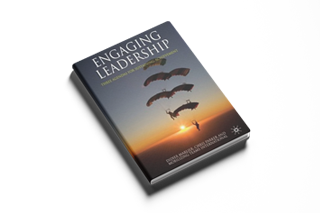(Charlotte Mader is one of our top coaches, specialised in accompanying neuro-divergent teams and individual. She shares with you her thoughts on Leadership)
What does it mean to be a good leader?
This is a question I have asked myself many times as a Manager in a Parisian start-up.
How do you bring your colleagues and clients on board with your projects? How do you communicate with impact ?
My 13 years in business and 3 years of entrepreneurship have allowed me to outline some answers, which I am pleased to share in this blog post.
Article Outline:
- A good leader is aligned with their nature and values
- A good leader knows how to lower their guard
- A good leader sets a clear course
- A good leader understands that everything is interconnected
- A good leader cultivates robustness
- A good leader decides, even amidst uncertainty
- A good leader takes care of their energy
- A good leader listens to and inspires their team
A good leader is aligned with their nature and values
This sort of alignment is essential to inspire trust, authenticity and consistency in leadership.
Seneca encouraged his followers to act from their true nature :
“We must examine whether our nature is more suited to political activity, or contemplate our withdrawal from public life, then reflect and lean towards where our personality takes us. Indeed, a frustrated nature yields nothing good: when nature resists, all efforts are in vain.” – Seneca, The Tranquillity of the Soul
Without alignment between our natural talents, our beliefs and the project we contribute to, it will be difficult to be a good leader. It is essential to question our values, our needs and our long-term desire to contribute.
A good leader knows how to lower their guard
Must we always pretend to be invulnerable ?
I remember the mask I wore in my last corporate job. This mask is called “Be strong” in transactional analysis.
Many beliefs are attached to it :
– “I am the expert in my field, I can’t ask colleagues for advice”
– “I was hired to manage this area, I can’t show that I don’t know”
– “I have to handle it alone”
– “I can’t joke about this topic”
It took several coaching sessions for me to understand that vulnerability can be a strength, and that showing vulnerability is also a step towards creating connections, by daring to ask colleagues and request help.
A good leader knows how to create psychological safety by daring to admit their mistakes and vulnerability. According to Brené Brown in her book “Dare to Lead”, it is not about disclosing everything about ourselves or oversharing our weaknesses or difficulties. It is about being honest about our difficulties in work situations, which gives others permission to be honest about their own feelings and to feel safe.
A good leader sets a clear course
“If a man knows not which port he sails, no wind is favourable.” – Seneca, Letters to Lucilius
Having a clear vision of what you are trying to achieve is essential on several levels :
- Defining a concrete action plan broken down into several sub-goals
- Communicating your vision within your ecosystem : your teams, clients or partners
- Checking each day if you are staying focused on this course or getting scattered
Here are some questions to define your course:
- What project do I want to contribute to? What is my “WHY”?
- What is my goal this year?
- What is my goal this quarter?
- What obstacles are in my way?
- What resources can I rely on to overcome these obstacles?
A good leader understands that everything is intertwined
You may have heard the phrase: “People don’t remember what you say, they remember how you made them feel.”
Or : “You are the average of the five people you spend the most time with.”
Indeed, the behaviour of those around us directly affects how we act.
Everything about our lifestyle habits impacts our leadership: our relationships, our sleep, our diet, our living environment.
Going even further, everything invisible also impacts our leadership : our emotions, thoughts, blockages, beliefs, energy, as well as our past successes and failures.
A good leader understands that they act from their inner state, and from what they nurture within themselves. This understanding invites a subtle exploration of what is invisible.
A good leader cultivates robustness
“A tree is only solid and robust if it must frequently resist gusts: the shocks tighten its fibres and fix its roots more deeply. The tree that grows in the gentleness of a valley remains fragile” – Seneca, Providence
A good leader weathers storms and sees difficulties as challenges and defeats as learning opportunities.
Olivier Hamant, biologist and research director at the French National Institute for Agriculture, Food, and Environment (INRAE), encourages us to shun performance and cultivate robustness.
Robustness aims to make a system viable in the long term, unlike performance, which seeks short-term optimisation.
“What we find in living beings is a lot of underperformance : a lot of redundancies, inconsistencies, and slowness too. They don’t bet on performance; they build robustness to keep the system stable despite fluctuations. They are robust precisely because they are not performant” – Olivier Hamant
A good leader decides, even amidst uncertainty
An effective leader recognizes that it is impossible to foresee everything and helps their team distinguish what is stable from what is not, by setting clear markers despite uncertainty.
Charles Pépin reveals a strong link between self-confidence and decision-making.
” To decide is to be present in the heart of uncertainty, in the heart of life itself. Each time we make a conscious decision, we learn a little more to trust ourselves. This acceptance of uncertainty is the first step of this inner metamorphosis, this wisdom of decision-making “- Charles Pépin, Self-confidence, a philosophy
According to the author, building self-confidence means engaging with uncertainty. Every small daily decision is an opportunity to train for bigger decisions.
A good leader takes care of their energy
In the constant flow of to-do lists and demands, it is important to dare to make our energy a priority.
This is especially true for people who identify as “highly sensitive,” and who are particularly sensitive to noise, light, and social interactions.
There are many protocols for taking care of your energy, notably those presented by Natacha Calestrémé in her book “The Key to Your Energy : 22 steps to rebuild your energy and free yourself emotionally »
More simply, it is about being attentive to what gives us energy and what drains it. This can be people, activities, or places.
The idea is to pay subtle attention to our bodily sensations, our level of fatigue, and adjust our actions to optimise our energy, in service of the impact we want to make at work.
A good leader listens to and inspires their team
The ability to listen is an underestimated skill in business.
Yet, it is a prerequisite for good communication and collaboration.
What does good listening involve?
- Asking open-ended questions
- Showing curiosity
- Reformulating accurately
- Allowing space for silence
- Putting yourself in the other person’s shoes
- Listening to understand, rather than to respond
When I think back to leaders who particularly inspired me in my career, they were people who :
- Emphasised the WHY, the deeper reason for the organisation
- Embodied the company’s values and led by example
- Focused on the team’s strengths
- Remained positive in adversity
Leadership is thus a complex posture rooted in intangible elements linked to the environment in which one evolves. It can be developed through alignment between one’s nature and mission, the definition of a clear vision, good listening skills, the ability to make decisions amidst uncertainty, and the management of one’s own energy.
To go further in your leadership posture or to work on specific leadership aspects, get in touch with Charlotte : [email protected] or Didier : [email protected].
Sources :
- Seneca, The Tranquility of the Soul and Letters to Lucilius
- Charles Pépin, Self-confidence, a philosophy
- Brené Brown, Dare to Lead
- Olivier Hamant, Antidote to the Cult of Performance
- Simon Sinek, Find Your Why



0 Comments